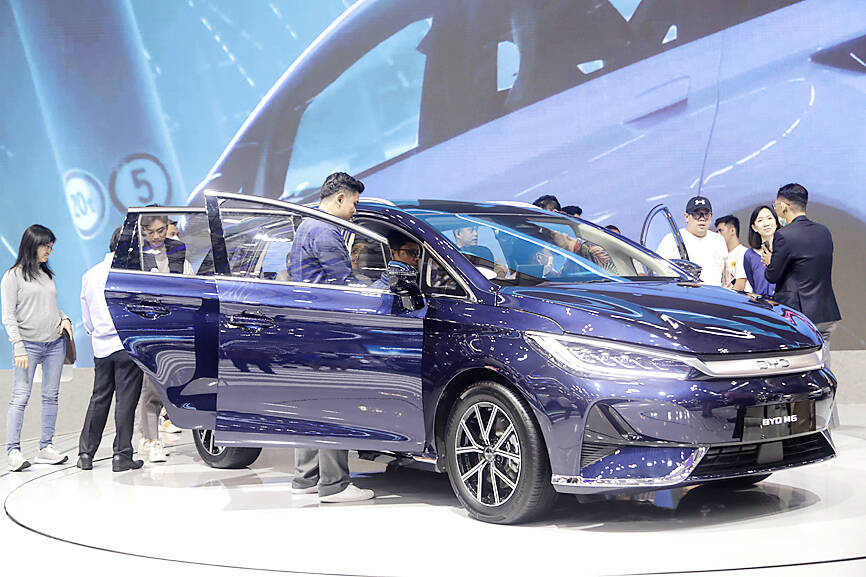A Thai investigation into discounts from China’s BYD Co (比亞迪) would continue despite a cash-back program from its distributor in response to a backlash from consumers who felt they overpaid for their electric vehicles (EV), a senior Thai official said on Friday.
Thailand, a regional auto assembly and export hub, is BYD’s largest overseas market, where it is the top-selling electric vehicle brand. BYD last month opened a factory in Thailand, its first in Southeast Asia.
Rever Automotive, BYD’s Thailand distributor, this week announced a cash-back program and discounts at charging stations until March next year.

Photo: EPA-EFE
Existing BYD customers can receive cash back of up to 50,000 baht (US$1,378) on their next purchase of the ATTO 3 or BYD Seals models from Thursday to the end of next month, Rever said in a Facebook post.
However, an investigation by the Thai Office of Consumer Protection Board would continue, with new complaints coming in, now more than 100, said Passakorn Thapmongkol, a senior official at the agency.
“We have another meeting next week so they can explain further,” said Passakorn, outlining discussions between the agency and Rever.
Rever, which has a network of more than 100 dealerships across Thailand, said the cash-back campaign was a promotion for old customers and not part of a compensation program.
BYD holds a 20 percent stake in Rever.
The issue came onto the government’s radar this month after Rever made sharp price cuts to its cars, as much as 340,000 baht for some models, triggering complaints from previous buyers of BYD EVs.
Thai Prime Minister Srettha Thavisin asked BYD chief executive officer Wang Chuanfu (王傳福) to ensure that Thai consumers were protected, to which Wang said its pricing would be appropriate.
Shenzhen-list BYD is part of a wave of Chinese automakers investing more than US$1.44 billion to set up new EV factories in Thailand, helped by government subsidies and tax incentives.
Pledged investments from other makers include Changan Auto with US$285 million.
The government aims to convert 30 percent of its 2.5 million vehicle production capacity to EVs by 2030.

Sweeping policy changes under US Secretary of Health and Human Services Robert F. Kennedy Jr are having a chilling effect on vaccine makers as anti-vaccine rhetoric has turned into concrete changes in inoculation schedules and recommendations, investors and executives said. The administration of US President Donald Trump has in the past year upended vaccine recommendations, with the country last month ending its longstanding guidance that all children receive inoculations against flu, hepatitis A and other diseases. The unprecedented changes have led to diminished vaccine usage, hurt the investment case for some biotechs, and created a drag that would likely dent revenues and

Nvidia Corp’s GB300 platform is expected to account for 70 to 80 percent of global artificial intelligence (AI) server rack shipments this year, while adoption of its next-generation Vera Rubin 200 platform is to gradually gain momentum after the third quarter of the year, TrendForce Corp (集邦科技) said. Servers based on Nvidia’s GB300 chips entered mass production last quarter and they are expected to become the mainstay models for Taiwanese server manufacturers this year, Trendforce analyst Frank Kung (龔明德) said in an interview. This year is expected to be a breakout year for AI servers based on a variety of chips, as

Global semiconductor stocks advanced yesterday, as comments by Nvidia Corp chief executive officer Jensen Huang (黃仁勳) at Davos, Switzerland, helped reinforce investor enthusiasm for artificial intelligence (AI). Samsung Electronics Co gained as much as 5 percent to an all-time high, helping drive South Korea’s benchmark KOSPI above 5,000 for the first time. That came after the Philadelphia Semiconductor Index rose more than 3 percent to a fresh record on Wednesday, with a boost from Nvidia. The gains came amid broad risk-on trade after US President Donald Trump withdrew his threat of tariffs on some European nations over backing for Greenland. Huang further

HSBC Bank Taiwan Ltd (匯豐台灣商銀) and the Taiwan High Prosecutors Office recently signed a memorandum of understanding (MOU) to enhance cooperation on the suspicious transaction analysis mechanism. This landmark agreement makes HSBC the first foreign bank in Taiwan to establish such a partnership with the High Prosecutors Office, underscoring its commitment to active anti-fraud initiatives, financial inclusion, and the “Treating Customers Fairly” principle. Through this deep public-private collaboration, both parties aim to co-create a secure financial ecosystem via early warning detection and precise fraud prevention technologies. At the signing ceremony, HSBC Taiwan CEO and head of banking Adam Chen (陳志堅)